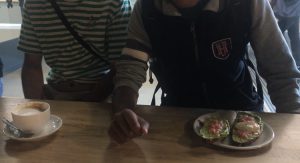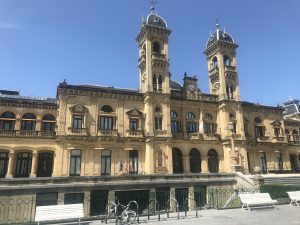
My favorite graffiti from the city, holding a Basque flag.

Café con leche and avocado toast at Tabakalera.

San Sebastían’s city hall.
When I was first assigned to this blog date, I was doubtful that I would have much to say about the Basque government. As a 19 year old, I (unfortunately) barely know how my own country’s government works- let alone that of a country I had never even heard of until this December. However, I promised to myself that when my class and I sat down to talk to Ander Caballero, the former Basque Country Delegate to the United States, I would try my absolute best to gain an understanding of the governing body of the country that I have called home for the last 3 weeks. One of the first points that Ander brought up was how the Basque government is in a state of recovery from the Spanish recession. After unemployment rates hit extreme levels, sometimes getting as high as 27%, the Basques are beginning to aim towards creating a more profitable future for its citizens by building up services such as the rail and education systems. The Spanish recession has had a significant impact on the social community of Spain. The labor market has yet to recover and the effects on the economic cycle have been much more drastic than that in other European countries. However, the Basques belong to a unique area and have laws and ideals that are much different from that of the rest of continental Europe. For instance, the Basques hold a unique set of views when it comes to the rights of prisoners. In the Basque Country, many people believe that prisoners should serve their time close to their hometown. The intended purpose of this is meant to allow family and friends to visit and give prisoners the hope they need to serve their time and be a better person when they are released. Although, not everyone agrees that this will bring about the desired results. Ander explained that one of the counter arguments facing this topic are people who argue that by placing prisoners close to their old “stomping grounds”, they can easily get back in touch with the people who they committed their crimes with in the first place. On the topic of this particular issue, I can see both sides and am not quite sure where I would stand if I were a Basque citizen. I think that this is where a lot of conflict stems from, as the Basque Country is only recently re-emerging after the recession and trying to get its footing back. In the end, I think it is all a result of trial and error to see what works for this unique autonomous region. It is societal issues such as this one that the Basques face on the road to financial and social recovery. Another aspect of the Basque Country that I found to be drastically different from that of the United States is how the Basque workplace functions. At the Mondragon Cooperative in the Basque Country, the wage of the highest-paid worker within that company cannot exceed more than 7 times that of the lowest paid worker. I found this to be striking in comparison to the United States, where this rule is broken almost universally, and young people are fighting to earn more than minimum wage to sustain a lifestyle. This sentiment of balance and equality among workers continues into other aspects of Basque workplaces as well. When voting on conflicts, every worker in the Modragon Cooperative has an equal say in the process. This means that no one worker has more power in their vote than another, so even if the CEO and the youngest recruit are butting heads, both of their votes are considered equally. Again, I feel that there are both ups and downs to this ideology and would like to someday see it in action.
As the Basque government attempts to move forward beyond its cloudy past, older generations are looking to the youth of the country to lead the way to success. As Kyle brought up during our discussion on the steps of the Tabakalera building, it can be difficult to be a young person who wants to make a noticeable change in society. Where do we start? How do we bring change in a positive way? Won’t the “big guys” always win?
When posed this question, Ander replied in a way that made me think introspectively about my own willingness to make change when I see something going in a way that I don’t agree with. He said that we need to bring change about in a way that we are passionate about. This means not only that taking our interests a step further and using them for a larger benefit, but also not just following what everyone else is doing. Being just another cog in the machine isn’t what is going to make change. You have to go against the grain to even begin to work towards your goals. Being in Spain, experiencing new cultures, and talking to inspired locals such as Ander has made me think a lot about what I want to do with my life. I don’t want to do things just because “that’s the way it is”. This trip, to me, has been all about challenging my beliefs and pushing me into foreign territory (both literally and figuratively). I hope that, as Ander did, I can continue to do the same, find my passion, and use it to bring about a change that I am proud of.
